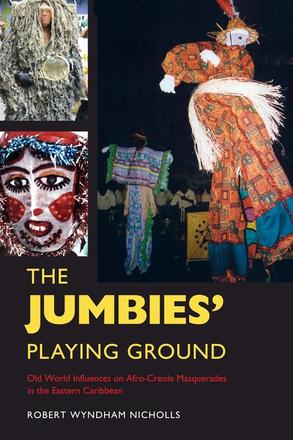
The Jumbies' Playing Ground
Old World Influences on Afro-Creole Masquerades in the Eastern Caribbean
A study of the carnival traditions that created “whole theater” folk pageants
Description
During the masquerades common during carnival time, jumbies (ghosts or ancestral spirits) are set free to roam the streets of Caribbean nations, turning the world topsy-turvy. Modern carnivals, which evolved from earlier ritual celebrations featuring disguised performers, are important cultural andeconomic events throughout the Caribbean, a direct link to a multilayered history.
This work explores the evolutionary connections in function, garb, and behavior between Afro-Creole masquerades and precursors from West Africa, the British Isles, and Western Europe. Robert Wyndham Nicholls utilizes a concept of play derived from Africa to describe a range of lighthearted and ritualistic activities. Along with Old World seeds, he studies the evolution of Afro- Creole prototypes that emerged in the Eastern Caribbean--bush masquerades, stilt dancers, animal disguises, she-males, female masquerades, and carnival clowns.
Masquerades enact social, political, and spiritual roles within recurring festivals, initiations, wakes, skimmingtons, and weddings. The author explores performance in terms of abstraction in costume-disguise and the aesthetics of music, songs, drum rhythms, dance, and licentiousness. He reveals masquerades as transformative agent, ancestral endorser, behavior manager, informal educator, and luck conferrer.
Reviews
"This study greatly expands the documentary record of masquerades in the Leeward Islands and offers a wealth of material for comparison with festive traditions elsewhere in the Caribbean. "
--Stephen Stuempfle, Society for Ethnomusicology, Indiana University, in New West Indian Guide, Issue 88 (2014)
- UPM
"Robert Nicholls has dedicated most of his scholarly life to disentangling the cultural crucible that is the Eastern Caribbean. We are all the richer for his unrelenting scholarly dedication to the topic. The scope and scale of his command of the literature on Caribbean, African and European forms of masquerade is truly impressive. His ability to decode the masquerade performances he has witnessed and bring them into scholarly juxtaposition to performances elsewhere ranks him among the foremost cultural analysts of his time. Anthropologists have long known that "play" is very serious business in all human societies. Robert Nicholls in The Jumbies' Playing Ground shows why. "
--James A. Pritchett, author of Friends for Life, Friends for Death: Cohorts and Consciousness in South Central Africa, and The Lunda-Ndembu: Style, Change and Social Transformation in South Central Africa
- UPM
"Astonishing detective work into the cultural history of body-mask performance in the Eastern Caribbean, with details about their European and African sources. Encyclopedic in scope, wise in analysis, this is a required reference as well as a model for future research. "
--Ivor L. Miller, author of Voice of the Leopard and Aerosol Kingdom
- UPM
"The Jumbies' Playing Ground sheds much new light on the masking traditions of the Eastern Caribbean, and those of the Leeward Islands in particular. In focusing on some of the understudied smaller islands of the region, Nicholls fills a major gap in our knowledge of Afro-Creole festivals that once played an important role in the slave plantation societies of the Caribbean. With its balanced treatment of African and European sources, its comparative thrust, and its attempt to grapple with the deeper meanings of these traditions, this carefully researched study will have lasting value. "
--Kenneth M. Bilby, author of True-Born Maroons and (with Jerome Handler) Enacting Power: The Criminalization of Obeah in the Anglophone Caribbean 1760-2011
- UPM